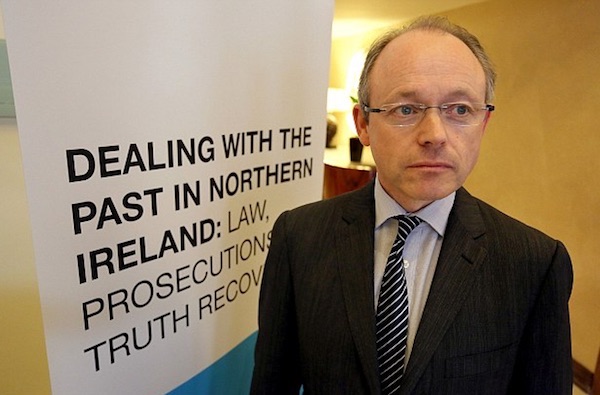
Families who lost loved ones at the hands of unionist paramilitaries acting in collusion with the state have criticised comments made by a former Director of Public Prosecutions for an end to conflict-related prosecutions.
Barra McGrory (pictured) said mechanisms proposed to deal with the legacy of the conflict will only result in “litigating the past for years to come”.
Mr McGrory said that current legacy proposals are “well meaning” but “unworkable”. He called for the end to prosecutions in favour of a civil inquiry.
“The criminal process will significantly inhibit the information process and to what end?
“Very few convictions will result, people will be as unhappy as they are now, and the opportunity to have a process which makes people truly accountable will be lost.”
His comments come amid strenuous efforts by Tories to block prosecutions of British soldiers over killings in Derry and Belfast dating from the 1970s.
Six families who lost loved ones at the hands of collusion have said they were “disappointed” at Mr McGrory’s comments.
Their loved ones died in attacks in Moy, Cappagh and Craigavon between 1990 and 1992 carried out by the UVF with the support of members of the locally-recuited British Army mregiment, the UDR.
In a joint statement the relatives said; “It is with dismay and great disappointment we read the interview with Barra McGrory.
“It is well known our loved ones were killed by paid state agents and members of the UDR.
“The murders were never properly investigated at the time and it is our belief that ample evidence exists to easily secure convictions if proper investigations were instigated.
“To halt such investigations would only serve to add to our suffering and deep sense of injustice we already feel.
“It doesn’t matter to us if the perpetrators ‘only’ serve two years in prison, simply to see them convicted in a court of law and named and shamed would greatly help the healing process and finally give a sense of closure.
“It is patently obvious Barra McGrory hasn’t a clue what victims’ families go through and we find it hard to understand why he would effectively give the state an amnesty for its agent’s deeds.”
McGrory’s attitude to prosecutions has also drawn criticism from legal figures. His decision not to prosecute a British soldier who shot dead a 15-year-old child in Derry in 1972 was described as “irredeemably flawed” by High Court judges in February.
That decision was formally quashed by the High Court this week after Daniel’s sister, Margaret Brady, issued judicial review proceedings against it.
Outside court the schoolboy’s family called on senior prosecutors to now being charges over the point-blank shooting of their son.
Mrs Brady said: “I would expect the prosecution service to come back within three months and say we are now going to prosecute, not drag it out for another four years. Are they waiting for all of the family to just die off?”
![[Irish Republican News]](https://republican-news.org/graphics/title_gifs/rn.gif)
![[Irish Republican News]](https://republican-news.org/graphics/title_gifs/harp.gif)

